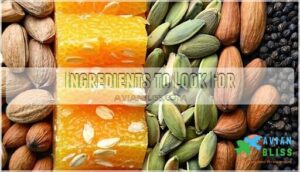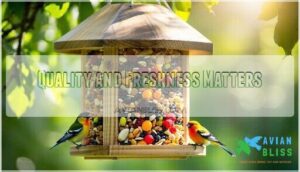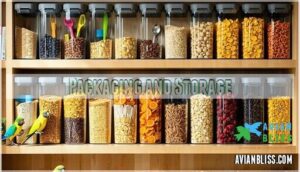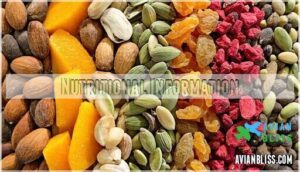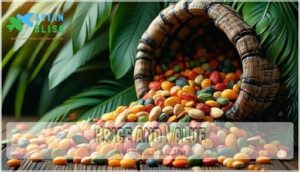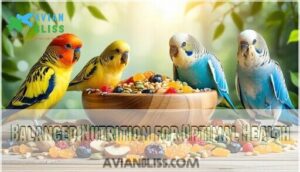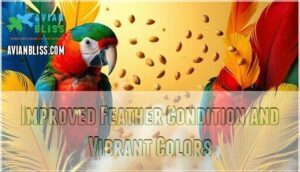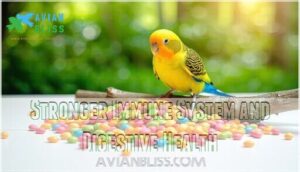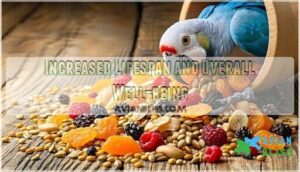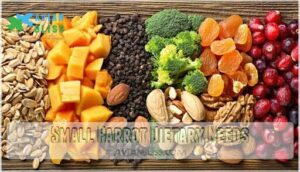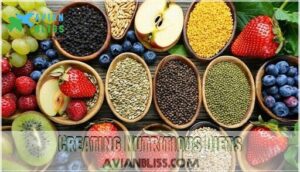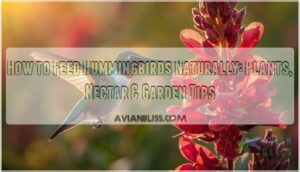This site is supported by our readers. We may earn a commission, at no cost to you, if you purchase through links.
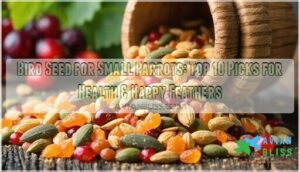
Look for blends with millet, safflower, canary seed, and essential vitamins. Avoid mixes heavy on sunflower seeds, as these can lead to weight issues.
Freshness is key, so check the packaging date and store seeds in airtight containers to preserve nutrients.
Small parrots, like budgies and lovebirds, benefit from added fruits and pellets for variety and health. A lively, colorful diet keeps your feathered friend happy, healthy, and chirping away.
Curious about top seed picks?
Table Of Contents
- Key Takeaways
- Choosing Bird Seed
- Top 10 Bird Seeds
- 1. ZuPreem Sensible Seed Bird Food
- 2. ZuPreem Parrot Seed and Pellet Blend
- 3. Small Hookbill Bird Food Garden Blend
- 4. Vitakraft Vita Smart Conure Food
- 5. Gourmet Parrot Food No Corn Soy
- 6. Small Hookbill Bird Food No Sunflower
- 7. ZuPreem Parakeet Seed Blend Bird Food
- 8. Premium Small Hookbill Parrot Bird Seed
- 9. Higgins Vita Seed Parrot Food Blend
- 10. Kaytee Supreme Parrot Food 5lb
- Bird Seed Benefits
- Small Parrot Dietary Needs
- Creating Nutritious Diets
- Frequently Asked Questions (FAQs)
- What is the best bird seed for small birds?
- What seed is best for parrots?
- Should I give my parrot seed or pellets?
- Can parrots eat regular bird seed?
- What is a good bird seed for small birds?
- What seeds are best for parrots?
- What do small parrots eat?
- Can small parrots eat sunflower seeds?
- How to store bird seed properly?
- What are safe seeds for parrots?
- Conclusion
Key Takeaways
- Look for high-quality bird seed mixes with ingredients like millet, canary seed, and safflower, and avoid blends heavy on sunflower seeds or fillers like corn.
- Add variety to your parrot’s diet with fresh fruits, vegetables, and pellets to ensure balanced nutrition and support their health.
- Store bird seed in airtight containers in a cool, dry place to maintain freshness and prevent spoilage.
- Use foraging toys and interactive feeders to make mealtime engaging, mimic natural behaviors, and keep your parrot mentally stimulated.
Choosing Bird Seed
Picking the right bird seed for your small parrot means focusing on quality ingredients that meet their nutritional needs.
Focus on quality bird seed blends that nourish your small parrot with balanced nutrients for vibrant feathers and boundless energy!
Look for fresh, nutrient-rich blends designed for species like parakeets or conures to keep them healthy and energetic.
Ingredients to Look For
When picking small parrot food, focus on ingredients that guarantee parrot nutrition.
Look for essential vitamins, beneficial minerals, healthy fats, and protein sources. Choose a seed mix with variety, such as sunflower hearts or thistle seeds, for balanced diets.
Avoid fillers like corn—these add bulk but little nutrition. Prioritize high-quality mixes formulated for small parrots’ needs, ensuring they receive the necessary nutrients for optimal health, including balanced diets.
Quality and Freshness Matters
Fresh seeds are key to healthy parrot food! Check expiration dates and store properly for quality.
Visual inspection matters—no dust or debris. Smell test guarantees freshness; bad odors mean issues.
Choose reputable brands that prioritize parrot nutrition. Fresh, small parrot food supports vibrant feathers and health.
A good choice will avoid harmful additives. Prioritize quality over discounts to keep your parrot happy and thriving!
Packaging and Storage
Storing bird seed right keeps your small parrot’s meals fresh and nutritious.
Use airtight containers to protect bird food from moisture and pests. Control humidity to extend shelf life and preserve quality.
Consider proper seed containers for ideal freshness.
Bulk storage works well, but don’t buy more than you’ll use quickly. Keep pet bird food in a cool, dry spot to maintain flavor and nutrients.
Nutritional Information
When choosing parrot food, focus on seed composition and nutritional value.
Small parrots thrive on a balanced diet rich in vitamins, minerals, and digestibility factors.
Seed mixes should support vitamin content and calorie density without being too fatty.
Poor-quality seeds lack essential minerals like calcium, iodine, or vitamin A.
Always prioritize a high-quality, nutrient-packed seed mix for their health.
Price and Value
When evaluating parrot food, focus on cost per serving and nutritional value cost.
Bulk buying benefits can maximize long-term savings, especially with affordable parrot seed options.
Compare brand prices to confirm you’re getting the best parrot seed for your small parrot’s needs.
Remember, high-quality small parrot food may cost more upfront but supports health, reducing vet bills later.
Top 10 Bird Seeds
Choosing the best bird seed for your small parrot guarantees they get a variety of nutrients to stay healthy and active.
In this list, you’ll find carefully selected options designed to meet the needs of species like parrotlets, budgies, and lovebirds.
1. ZuPreem Sensible Seed Bird Food
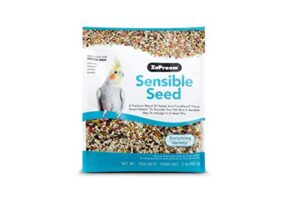
With ZuPreem Sensible Seed Bird Food, you’re giving your small parrot a wholesome, tasty mix they’ll love.
This premium blend combines FruitBlend Flavor Smart Pellets with seeds like safflower and pumpkin, promoting balanced nutrition and engaging their natural foraging instincts.
It’s sunflower-free, making it a healthier choice for species like cockatiels, lovebirds, and small conures.
Fortified with essential vitamins and minerals, this mix supports vibrant feathers and strong immunity, and should be stored in a cool, dry place to keep every bite fresh, ensuring balanced nutrition and maintaining strong immunity.
Best For: Small parrots like cockatiels, lovebirds, and conures that need a balanced, sunflower-free diet to support their health.
- Combines seeds and FruitBlend Flavor Smart Pellets for balanced nutrition.
- Fortified with vitamins and minerals for vibrant feathers and strong immunity.
- Encourages natural foraging instincts, keeping birds engaged and active.
- Some birds may require a transition period to accept pellets.
- Not suitable as a sole diet; should only be up to 30% of total bird diet.
- Mixed reviews on pellet shapes and flavors, which may not appeal to all birds.
2. ZuPreem Parrot Seed and Pellet Blend
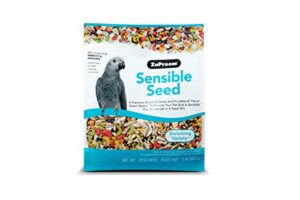
ZuPreem’s blend of seeds and pellets is a parrot’s go-to for balanced nutrition.
Made for Conures, Caiques, African Greys, and more, it includes essential vitamins and minerals to support energy and vibrant feathers.
With just 10% sunflower seeds, it reduces waste while promoting superior health.
The resealable bag keeps everything fresh, and its variety encourages natural foraging.
Recommended by vets, this mix is ideal for picky eaters and offers complete daily nourishment.
Give your bird a happier, healthier diet today!
Best For: Parrot owners looking for a balanced, vet-recommended blend for picky eaters and active birds like Conures, Caiques, and African Greys.
- Contains essential vitamins and minerals for health and vibrant feathers.
- Resealable bag maintains freshness and convenience.
- Encourages natural foraging and reduces food waste.
- Slightly more expensive compared to similar products.
- Mixed reviews on freshness upon delivery.
- Contains artificial colors, which may not appeal to all bird owners.
3. Small Hookbill Bird Food Garden Blend
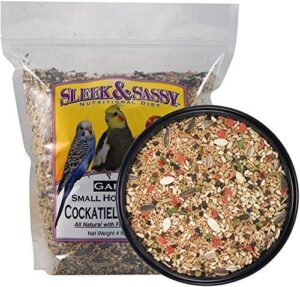
Small Hookbill Bird Food Garden Blend lets your feathered friend thrive with its thoughtful mix of fresh seeds and grains.
Designed specifically for small parrots like lovebirds and parrotlets, it provides a wholesome, nutritious diet.
The blend includes nutrient-packed safflower, white millet, and canary seed, formulated for birds needing variety and balance.
Bonus: The vacuum-packed freshness and dust-free preparation keep every bite enjoyable and healthy.
If your parrot’s meals could talk, they’d rave about this garden-inspired treat that supports better health and happier feathers!
Best For: Small parrots like lovebirds, parrotlets, and other finicky eaters needing a balanced, nutritious diet.
- All-natural ingredients with no artificial colors or sulfites.
- Includes fresh fruits, vegetables, and multiple protein sources.
- Vacuum-packed for freshness and dust-free preparation.
- Slightly expensive compared to similar products.
- Initial loose droppings may occur during the transition period.
- Not available in all local stores.
4. Vitakraft Vita Smart Conure Food
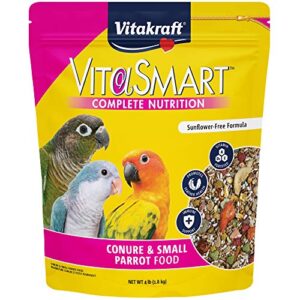
Vitakraft Vita Smart Conure Food offers a delightful blend of nutrition and variety for your feathered friend.
Packed with safflower seeds, tropical fruits, and grains, it’s fortified with essential vitamins like A, D3, and E to support vibrant feathers and strong bones.
The mix also includes probiotics for improved digestion and Aloe Vera for healthier skin.
Its resealable bag helps keep the food fresh, minimizing waste, and ensures that Conures will love the tasty ingredients, keeping them happy and full of energy daily.
Best For: Medium-sized parrots like Conures, Senegals, and Quakers seeking nutrient-rich, diverse food mixes for vibrant health.
- Fortified with essential vitamins and probiotics for digestion and feather health.
- Resealable packaging ensures freshness and reduces waste.
- All-natural mix with high-quality ingredients and no artificial preservatives.
- Contains added colors which may not appeal to all bird owners.
- Some birds selectively eat favorite components, leading to waste.
- Availability issues reported on some purchasing platforms like Amazon.
5. Gourmet Parrot Food No Corn Soy
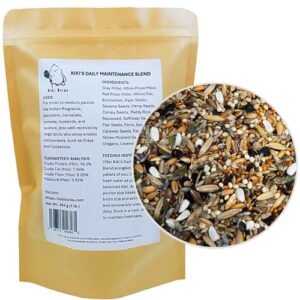
Gourmet Parrot Food No Corn Soy is a premium blend perfect for medium to large parrots.
It’s packed with seven tree nuts, including almonds and macadamias, alongside tropical fruits like mango and papaya. Free from corn, peanuts, and GMOs, it guarantees a clean, nutrient-rich diet for your feathered friend.
You can serve it dry or cooked for variety. This mix supports health, feather quality, and energy levels while satisfying natural foraging instincts.
It’s a wholesome choice for your parrot’s well-being!
Best For: Medium to large parrots that enjoy a diverse mix of nuts and tropical fruits for natural foraging and balanced nutrition.
- Packed with seven tree nuts and tropical fruits for variety and natural foraging.
- Free from corn, peanuts, and GMOs, ensuring a clean diet.
- Can be served dry or cooked for flexibility.
- Not suitable for small parrots due to larger nut pieces.
- May require preparation if serving cooked.
- Higher price point compared to standard seed mixes.
6. Small Hookbill Bird Food No Sunflower
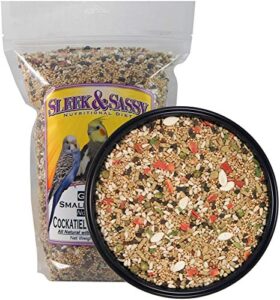
Small Hookbill Bird Food No Sunflower is a fantastic option for Cockatiels, Lovebirds, and Conures.
This blend skips sunflower seeds, focusing instead on high-quality ingredients like millet, canary seed, safflower, and buckwheat.
It’s vacuum-sealed to lock in freshness, ensuring your feathered companions enjoy every bite.
Packed with vitamins and minerals, this mix delivers balanced nutrition.
Perfect as a daily diet or training treat, its thoughtful formula supports their health and mimics a natural diet.
Birds thrive when fed this wholesome blend!
Best For: Cockatiels, Lovebirds, and Conures needing a balanced, sunflower-free diet.
- High-quality ingredients and vacuum-sealed freshness.
- Packed with essential vitamins and minerals for balanced nutrition.
- Mimics a natural diet for small hookbills.
- Lacks sunflower seeds, requiring supplements for sunflower lovers.
- May be more expensive compared to other options.
- Some birds might need time to adjust to the blend.
7. ZuPreem Parakeet Seed Blend Bird Food
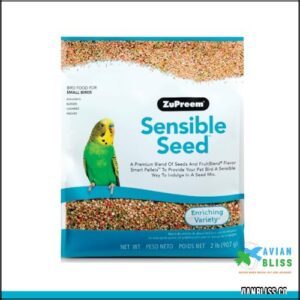
Feeding your feathered friend a balanced diet is essential, and this blend checks all the right boxes.
ZuPreem’s Parakeet Seed Blend Bird Food combines nutrient-packed seeds, vibrant FruitBlend Flavor Smart Pellets, and dried fruits like apples and bananas.
It provides essential vitamins, minerals, and amino acids to support small parrots like Parakeets, Budgies, and Parrotlets.
Shake the bag before serving and offer 1-3 tablespoons daily.
This mix supports health and encourages natural foraging instincts—keeping meals engaging and nutritious, which is crucial for the well-being of your pet.
Best For: Small birds like Parakeets, Budgies, Parrotlets, Canaries, and Finches needing a balanced, enriching diet.
- Nutrient-packed blend with seeds, pellets, and dried fruits.
- Encourages natural foraging instincts in birds.
- Includes added vitamins and minerals to support health.
- Contains artificial colors which may concern some owners.
- Packaging issues reported during shipping due to weight.
- Not ideal for birds on low-seed diets as seed content is significant.
8. Premium Small Hookbill Parrot Bird Seed
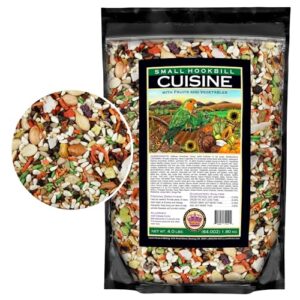
In the case of feeding your small hookbills, the Premium Small Hookbill Parrot Bird Seed combines quality and variety effortlessly.
Packed with hulled sunflower seeds, peanuts, pumpkin seeds, and dried fruits, it’s both nutritious and delicious.
This blend boosts energy, supports healthy digestion, and adds vibrancy to your bird’s feathers.
The resealable packaging keeps the mix fresh while also making storage simple.
Designed for lovebirds, parrotlets, and cockatiels, it’s an excellent supplemental treat that makes bird care has never been easier or tastier.
Best For: Bird lovers seeking a high-quality, natural seed blend for small hookbills like lovebirds, parrotlets, and cockatiels.
- Nutrient-rich blend that supports energy, digestion, and feather health.
- Includes natural ingredients like dried fruits, vegetables, and seeds.
- Resealable, eco-friendly packaging for freshness and easy storage.
- Not a complete diet; designed as a supplemental treat.
- Higher price point compared to basic seed mixes.
- May not appeal to birds with specific ingredient preferences.
9. Higgins Vita Seed Parrot Food Blend
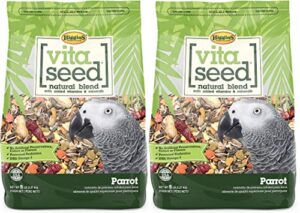
For small parrots craving variety, Higgins Vita Seed Parrot Food Blend delivers balanced nutrition.
Packed with natural seeds, omega-3s, and probiotics, it supports strong immunity and digestive health.
This mix avoids artificial colors, offering wholesome ingredients that even picky eaters love.
Every bite is a treat, thanks to dried fruits and vegetables alongside top-grade seeds.
Its clean packaging guarantees freshness and convenience for daily feeding.
Keep your parrot happy and healthy with this premium blend, perfect for all life stages!
Best For: Parrot owners looking for a natural and nutritious seed mix to support their bird’s health at all life stages.
- Packed with omega-3s, probiotics, and vitamins for immune and digestive health.
- Natural ingredients with no artificial colors or preservatives.
- Highly preferred by parrots, including picky eaters.
- Some customers report less sunflower seed content than expected.
- Premium pricing compared to other options.
- Requires additional fresh fruits and vegetables for a complete diet.
10. Kaytee Supreme Parrot Food 5lb
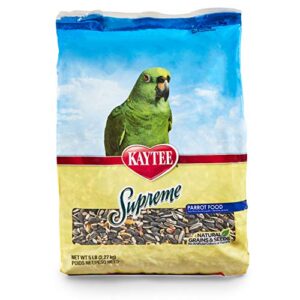
Kaytee Supreme Parrot Food offers a straightforward formula that focuses on natural ingredients for parrots.
Packed with high-quality seeds like sunflower and millet, it’s fortified with essential vitamins and minerals to support your bird’s overall health and vibrant feathers.
The 5-lb bag maintains freshness with its resealable packaging, while the balanced blend delivers protein, fiber, and healthy fats.
Although some birds may prefer specific seeds, its simplicity appeals to many. Store it properly to avoid pantry moths and maintain its nutritional quality.
Best For: Parrot owners looking for a natural, fortified seed mix with essential nutrients for their bird’s health.
- Natural ingredients with no artificial colors or flavors.
- Fortified with essential vitamins and minerals.
- Resealable packaging for freshness.
- Mixed reviews on seed variety appeal to birds.
- Risk of pantry moth infestations if not stored properly.
- Reports of packaging issues, including contamination concerns.
Bird Seed Benefits
Feeding your small parrot the right seeds supports balanced nutrition, keeping them active and healthy.
Quality bird seed can enhance their feather condition, boost their immune system, and promote overall well-being.
Balanced Nutrition for Optimal Health
Choosing the right parrot food isn’t just about filling bowls; it’s about ensuring nutrient absorption and preventing dietary deficiencies.
A balanced diet, rich in high-quality seed mixes, promotes holistic birdcare and maintains a healthy weight.
Look for these in small parrot food:
- Vitamins A, D, E
- Calcium-rich seeds
- Omega-3 fatty acids
- Natural grains
- Fresh, premium ingredients
The key to a healthy parrot is providing a diet that includes all the necessary components for holistic birdcare.
Improved Feather Condition and Vibrant Colors
Healthy feathers need more than grooming—they need the right fuel.
A well-balanced seed mix rich in nutrients like beta-carotene and Vitamin A boosts feather pigments, keeping colors vibrant.
Including varied small parrot food with supplements supports molting cycles and overall feather health.
Choose food blends designed for dietary impact, as high-quality parrot food guarantees fluff-worthy, glossy feathers every day.
Addressing issues such as stress and poor diets can substantially improve feather quality and support parrot food decisions.
Stronger Immune System and Digestive Health
A healthy gut microbiome is key to your parrot’s immune and digestive health.
Look for small parrot food with probiotics and fiber-rich seed mixes.
These support:
- Probiotic benefits for better nutrient absorption.
- Enzyme support to ease digestion.
- Fiber intake to prevent blockages.
- Toxin reduction for vibrant health.
- Balanced seeds promoting overall well-being.
Strong digestion boosts immunity, keeping your parrot thriving.
Increased Lifespan and Overall Well-being
A well-balanced parrot diet doesn’t just keep your small bird full—it fuels their life.
With proper bird nutrition, nutrient absorption improves, boosting energy and aiding disease prevention.
Quality small parrot food also enriches behavior by encouraging natural activity levels.
Customized parrot food, paired with attention to environmental factors, supports a healthy small bird diet, promoting longevity and overall well-being.
Small Parrot Dietary Needs
Your small parrot’s dietary needs go beyond just filling their bowl with seeds; they require a balanced mix of proteins, healthy fats, vitamins, and minerals for peak health.
By focusing on high-quality ingredients and avoiding artificial fillers, you can help support their energy, bright feathers, and overall well-being.
Protein and Fat Requirements
Protein and fat fuel your small parrot’s growth, energy, and vibrant plumage.
Offer balanced parrot food to meet their needs while avoiding overfeeding seeds, which are often high in fat but low in nutrients.
- Prioritize protein sources like legumes or tofu.
- Use low-fat types of seeds sparingly.
- Watch for deficiency symptoms like feather loss.
- Adjust breeding diets for higher protein.
Importance of Vitamins and Minerals
Vitamins and minerals are the lifeblood of small parrots, helping their feathers shine and their bodies thrive.
Without them, vitamin deficiency can stunt health, and poor mineral absorption weakens bones. Look for parrot food rich in natural sources like seeds and pellets. Supplement options can fill gaps for small parrots needing a boost.
Below is a quick guide:
| Vitamins | Natural Sources | Health Benefits |
|---|---|---|
| Vitamin A | Carrots, sweet potatoes | Bright feathers, clear eyes |
| Vitamin D | Direct sunlight, pellets | Strong bones, egg health |
| Vitamin C | Bell peppers, oranges | Immune system support |
Avoiding Fillers and Artificial Ingredients
When picking small parrot food, skip mixes with fillers like red millet or corn.
Birds often toss these aside, wasting money and space in diets.
Stick to natural parrot food with high-quality ingredients. USDA-certified organic options are preferable for your bird.
Organic seeds and natural preservatives are better for ingredient sourcing. Always read labels to spot artificial dyes or flavorings.
Choose fresh seed alternatives for healthier parrots.
Providing a Variety of Food Options
Diversity keeps meals exciting and healthy for small parrots.
Mixing seed alternatives, fresh fruits, and pellets supports dietary enrichment and foraging behavior.
A balanced parrot food variety improves nutritional balance while preventing boredom.
Rotate food options, including occasional seed mix treats, to mimic nature’s variety benefits and guarantee small parrots embrace every feeding session with curiosity and joy.
Creating Nutritious Diets
Creating a nutritious diet for your small parrot means combining high-quality seeds with fresh fruits and vegetables to meet their unique nutritional needs.
By rotating food options and incorporating foraging toys, you can support their natural behaviors and keep mealtime exciting.
Mixing Different Bird Seeds and Grains
Combining seed mixes creates Seed Synergy, ensuring a Nutritional Balance for your parrot.
Blend small bird seed with grains like millet and canary seed for Dietary Variety. Pay attention to bird seed ingredients, avoiding toxicity from fillers.
Consider various parrot seed options for a well-rounded diet. A smart Grain Combination supports health and energy, making your bird’s diet more dynamic.
Experiment with bird seed mix proportions for ideal results.
Adding Fresh Fruits and Vegetables
Small parrots love fresh fruits and veggies, and they’re packed with nutritional benefits.
Make safe produce by washing thoroughly and cutting into parrot-friendly portions. Stick to parrot-safe options like apples, carrots, or leafy greens.
Preparation methods matter—raw, chopped pieces work best. Variety is key to parrot health, so offer colorful options to keep parrot feeding exciting while boosting diets naturally.
For a calcium boost, consider adding kale to their diet.
Rotating Food Options to Prevent Boredom
Switching up parrot food keeps mealtime exciting and mirrors natural foraging habits.
Introduce seasonal food changes or alternate parrot treats weekly to prevent monotony. Texture variety enriches their experience and keeps them curious.
Gradually add new items to guarantee acceptance. Food rotation benefits include mental stimulation and better nutrition, making parrot feeding a prime opportunity for natural behavior and enrichment.
Using Foraging Toys and Interactive Feeders
Foraging toys and interactive feeders are essential for parrot enrichment. They encourage natural behaviors like problem-solving and mimic wild feeding habits.
These tools pair perfectly with foraging diets and seed mixes, providing mental stimulation and enrichment benefits. A variety of toys keeps your parrot engaged, ensuring they never get bored while exploring exciting challenges during mealtime.
Consider that parrots enjoy stimulating foraging options to keep them entertained. It’s bird-approved fun with natural behaviors.
Frequently Asked Questions (FAQs)
What is the best bird seed for small birds?
Choose a high-quality seed mix with varied ingredients like millet, canary grass seed, and sunflower kernels, formulated for your bird’s species.
Avoid mixes with excessive filler.
Add fresh fruits and veggies for balanced nutrition.
What seed is best for parrots?
Parrots thrive on a balanced diet of high-quality pellets, supplemented with fresh fruits, vegetables, and occasional seeds as treats.
Look for species-specific seed mixes with minimal sunflower content to guarantee superior health and happiness.
Should I give my parrot seed or pellets?
You should balance seeds and pellets for your parrot.
Seeds alone lack nutrients, while pellets give a complete diet.
Add fresh fruits and veggies too.
Variety keeps your parrot healthy and mentally stimulated.
Can parrots eat regular bird seed?
Regular bird seed isn’t ideal for most parrots because it lacks balanced nutrition.
Parrots thrive on species-specific diets with pellets, fruits, and veggies.
Seeds can be occasional treats but shouldn’t form the main diet.
What is a good bird seed for small birds?
Feeding small birds is like tuning a delicate instrument—use high-quality, species-specific seed mixes with fresh millet, canary grass, and small seeds.
Avoid mixes with fillers or sunflower overload to guarantee their health and happiness.
What seeds are best for parrots?
Offer your parrot high-quality seed mixes with minimal sunflower seeds and added nutrients.
Combine with pellets and fresh fruits for balanced nutrition.
Avoid seed-only diets—parrots need diverse foods for health and happiness.
What do small parrots eat?
A tiny parrot’s plate isn’t just about seeds; it’s a mix of pellets, fresh veggies, and fruits.
Sprinkle in small seeds like millet or canary seed for variety, but keep portions small to avoid imbalance, focusing on a complete mix.
Can small parrots eat sunflower seeds?
Yes, small parrots can eat sunflower seeds, but only as an occasional treat.
They’re high in fat and lack essential nutrients.
Balance their diet with pellets, fresh fruits, and vegetables for ideal health and energy.
How to store bird seed properly?
Did you know improper storage can reduce seeds’ nutrients by 80%?
Keep bird seed fresh by using airtight containers in a cool, dry spot, away from sunlight and pests.
Regularly check for mold or spoilage, and consider improper storage can significantly impact seed quality.
What are safe seeds for parrots?
Safe seeds for parrots include millet, canary seed, safflower, and hemp.
Avoid sunflower seeds as a primary diet—they’re too fatty.
Balance seeds with pellets, fruits, and veggies to keep your parrot healthy and thriving.
Conclusion
As the saying goes, "You are what you eat," and this holds true for small parrots too.
Selecting the right bird seed for small parrots guarantees they get balanced nutrition for vibrant feathers, strong immunity, and a happy chirping demeanor.
Prioritize fresh blends with millet, safflower, and added fruits or pellets, while avoiding heavy sunflower content.
Store it properly to maintain quality, and by tailoring their diet thoughtfully, you’ll support their health and create joy for your feathered friend daily.

